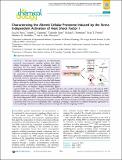Characterizing the Altered Cellular Proteome Induced by the Stress-Independent Activation of Heat Shock Factor 1
Author(s)
Ryno, Lisa M.; Genereux, Joseph C.; Naito, Tadasuke; Morimoto, Richard I.; Powers, Evan T.; Shoulders, Matthew D.; Wiseman, R. Luke; ... Show more Show less
Downloadcb500062n.pdf (3.214Mb)
PUBLISHER_POLICY
Publisher Policy
Article is made available in accordance with the publisher's policy and may be subject to US copyright law. Please refer to the publisher's site for terms of use.
Terms of use
Metadata
Show full item recordAbstract
The heat shock response is an evolutionarily conserved, stress-responsive signaling pathway that adapts cellular proteostasis in response to pathologic insult. In metazoans, the heat shock response primarily functions through the posttranslational activation of heat shock factor 1 (HSF1), a stress-responsive transcription factor that induces the expression of cytosolic proteostasis factors including chaperones, cochaperones, and folding enzymes. HSF1 is a potentially attractive therapeutic target to ameliorate pathologic imbalances in cellular proteostasis associated with human disease, although the underlying impact of stress-independent HSF1 activation on cellular proteome composition remains to be defined. Here, we employ a highly controllable, ligand-regulated HSF1 that activates HSF1 to levels compatible with those that could be achieved using selective small molecule HSF1 activators. Using a combination of RNAseq and quantitative proteomics, we define the impact of stress-independent HSF1 activation on the composition of the cellular proteome. We show that stress-independent HSF1 activation selectively remodels cytosolic proteostasis pathways without globally influencing the composition of the cellular proteome. Furthermore, we show that stress-independent HSF1 activation decreases intracellular aggregation of a model polyglutamine-containing protein and reduces the cellular toxicity of environmental toxins like arsenite that disrupt cytosolic proteostasis. Collectively, our results reveal a proteome-level view of stress-independent HSF1 activation, providing a framework to establish therapeutic approaches to correct pathologic imbalances in cellular proteostasis through the selective targeting of HSF1.
Date issued
2014-04Department
Massachusetts Institute of Technology. Department of ChemistryJournal
ACS Chemical Biology
Publisher
American Chemical Society (ACS)
Citation
Ryno, Lisa M. et al. “Characterizing the Altered Cellular Proteome Induced by the Stress-Independent Activation of Heat Shock Factor 1.” ACS Chemical Biology 9, 6 (April 2014): 1273–1283 © 2014 American Chemical Society
Version: Final published version
ISSN
1554-8929
1554-8937